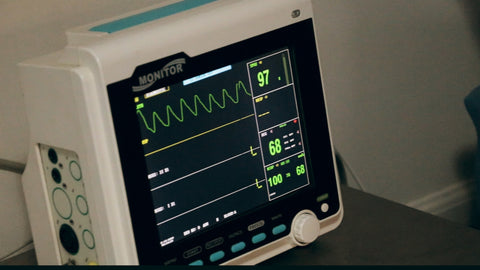What’s the best way to improve your nighttime routine for quality sleep?
Just like any endeavor, the first step to achieving deep sleep is to come up with a game plan.
If you’re maybe brushing your teeth, crashing with the TV on, and very rarely clocking seven to nine hours of snooze time, you’re doing it all wrong.
But today’s tips will help you create healthy habits for a sleep routine you can actually stick to.

First, Set a Legit Bedtime (and a Bedtime Alarm)
Remember when you had to be in bed with the lights out by a specific time as a kid?
Your parents knew you needed sleep to grow, stay healthy, focus in school, and be nice to your siblings.
So who’s setting your bedtime now that you’re an adult?
Setting a strict time to hit the hay allows you to plan an early dinner and fit all your other pre-sleep activities into your hectic schedule.
So count back eight hours from your wake-up alarm for work and make this your weeknight bedtime. Add this alarm to your phone so you’re reminded to get ready for sleep on time.

Create a Wind-Down Routine
Better sleep hygiene starts with activities that help you wind down from your stressful day and prepare you for restorative REM sleep.
Clear out toxins and grime from your workday and start the night fresh. Wash your face, brush your teeth, and pamper your tired hands with a special overnight lotion.
Bring out essential oils like lavender, cedar-wood, and eucalyptus to create a quiet, calm environment for mindful relaxation.
Make it dark and cold. Science says most people do well in a dark sleep environment that’s less than 70 degrees warm. So wear an eye mask to bed and lower the temperature a few degrees to create your cozy slumber cave.

Start Ghosting Your Devices and Screens
Switch devices like phones, tablets, and readers to nighttime mode a few hours before bedtime to block the insomnia-inducing blue light emitted from their screens.
But that’s not the only thing that may keep you up.
Sometimes these devices also keep your mind active at night, which makes it harder for you to tune out life and fall asleep.
So cut off all devices and screens at least one hour before bed (and two hours for children).
Set your phone on silent or airplane mode and you won’t be interrupted by buzzing notifications all night.
Even better, flip your phone face down to avoid seeing the screen light up with alerts.

Eat Your Way to Better Sleep
Many people are surprised to learn that what you eat affects the quality of your sleep.
You probably already know you should avoid caffeine (like coffee or tea), chocolate, and sweets in the afternoon. These stimulants make it harder to calm down later in the evening.
But did you know certain foods may help promote better rest?
Amino acids, such as GABA, glutamine, glycine, L-theanine, and tryptophan, have all been studied for their abilities to improve sleep quality.
You can get these amino acids (aka the building blocks of protein) right from your diet. Or you can try supplementing to meet your protein and sleep goals just the same.
Just make sure to stop eating at least two hours before bed to give your body time to digest and start the rest/repair process.
Contrary to what you may think, it’s also smart to skip the wine-down routine, or any other alcohol before bed.
It may seem like it helps you fall asleep, but it’s really just a recipe for poor quality sleep that’s frequently interrupted (i.e., not worth it).
![]()
Improve Your Nighttime Routine; Wake Up Feeling Amazing
No matter how busy your day, anyone can tackle these easy tips for better sleep.
So create a plan for your sleep routine before bed tonight. Then try to stick with it for the next 30 days to establish a healthy habit.
Try not to show off too much when you’re conquering your daily grind like a well-rested superhero.
Author: Devan Ciccarelli
Email: devan@behappynothangry.com
Instagram/Facebook Group: @behappynothangry/Be Happy Not Hangry
Website: www.behappynothangry.com




